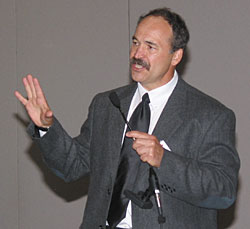
Jim Robl, president and CSO of Hematech LLC, describes the applications of transgenic technology to animal agriculture.
Transferring cattle genes
 Jim Robl, president and CSO of Hematech LLC, describes the applications of transgenic technology to animal agriculture. |
– by Crystal Albers